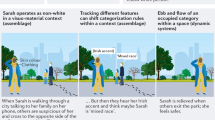Abstract
Computational social science methodologies are increasingly being viewed as critical for modeling complex individual and organizational behaviors in dynamic, real world scenarios. However, many challenges for identifying, representing and incorporating appropriate socio-cultural behaviors remain. Social theories provide rules, which have strong theoretic underpinnings and have been empirically validated, for representing and analyzing individual and group interactions. The key insight in this paper is that social theories can be embedded into computational models as functional mappings based on underlying factors, structures and interactions in social systems. We describe a generic framework, called a Culturally Infused Social Network (CISN), which makes such mappings realizable with its abilities to incorporate multi-domain socio-cultural factors, model at multiple scales, and represent dynamic information. We explore the incorporation of different social theories for added rigor to modeling and analysis by analyzing the fall of the Islamic Courts Union (ICU) regime in Somalia during the latter half of 2006. Specifically, we incorporate the concepts of homophily and frustration to examine the strength of the ICU’s alliances during its rise and fall. Additionally, we employ Affect Control Theory (ACT) to improve the resolution and detail of the model, and thus enhance the explanatory power of the CISN framework.
Access this chapter
Tax calculation will be finalised at checkout
Purchases are for personal use only
Preview
Unable to display preview. Download preview PDF.
Similar content being viewed by others
References
Santos, E.E., Santos, Jr. E., Pan, L., Wilkinson, J.T.: Culturally Infused Social Network Analysis. In: Proceedings of the International Conference on Artificial Intelligence (IC-AI), pp. 449–455 (2008)
Santos, E.E., Santos Jr., E., Wilkinson, J.T., Korah, J., Kim, K., Li, D., Yu, F.: Modeling Complex Social Scenarios Using Culturally Infused Social Networks. In: Proceedings of the IEEE International Conference on Systems, Man, and Cybernetics, Anchorage, AK, pp. 3009–3016 (2011)
Heise, D.R.: Expressive Order: Confirming Sentiments in Social Actions. Springer, New York (2007)
Axelrod, R., Bennett, D.S.: A Landscape Theory of Aggregation. Br. J. Polit. Sci. 23, 211–233 (1993)
McPherson, M., Smith-Lovin, L., Cook, J.: Birds of a Feather: Homophily in Social Networks. Rev. Lit. Arts Am. 27, 415–444 (2008)
Wu, B., Birkin, M., Rees, P., Heppenstall, A., Turner, A., Clarke, M., Townend, P., Xu, J.: Moses: An Innovative Way to Model Heterogeneity in Complex Social Systems. In: 2010 Second Int. Conf. Comput. Model. Simul., pp. 366–370 (2010)
Santos Jr., E., Santos, E.S.: A Framework for Building Knowledge-Bases Under Uncertainty. J. Exp. Theor. Artif. Intell. 11, 265–286 (1999)
Santos, J. E., Zhao, Q.: Adversarial Models for Opponent Intent Inferencing. In: Kott, A., McEneaney, W. (eds.) Adversarial Reasoning: Computational Approaches to Reading the Opponents Mind, pp. 1–22. Chapman & Hall/CRC, Boca Raton (2006)
Santos, J. E., Wilkinson, J.T., Santos, E.E.: Bayesian Knowledge Fusion. In: Proceedings of the 22nd International FLAIRS Conference, pp. 559–564 (2009)
Barnes, C., Hassan, H.: The rise and fall of Mogadishu’s Islamic courts. J. East. African Stud. 1, 151–160 (2007)
Heise, D.R.: Understanding events: affect and the construction of social action. Cambridge Univ. Press, New York (1979)
Author information
Authors and Affiliations
Editor information
Editors and Affiliations
Rights and permissions
Copyright information
© 2014 Springer International Publishing Switzerland
About this paper
Cite this paper
Santos, E.E. et al. (2014). Incorporating Social Theories in Computational Behavioral Models. In: Kennedy, W.G., Agarwal, N., Yang, S.J. (eds) Social Computing, Behavioral-Cultural Modeling and Prediction. SBP 2014. Lecture Notes in Computer Science, vol 8393. Springer, Cham. https://doi.org/10.1007/978-3-319-05579-4_42
Download citation
DOI: https://doi.org/10.1007/978-3-319-05579-4_42
Publisher Name: Springer, Cham
Print ISBN: 978-3-319-05578-7
Online ISBN: 978-3-319-05579-4
eBook Packages: Computer ScienceComputer Science (R0)




